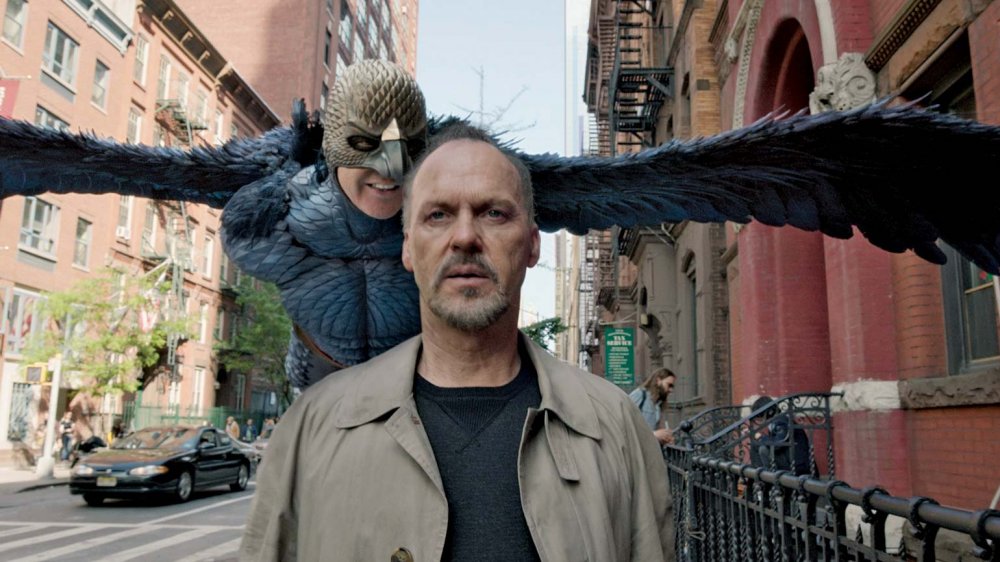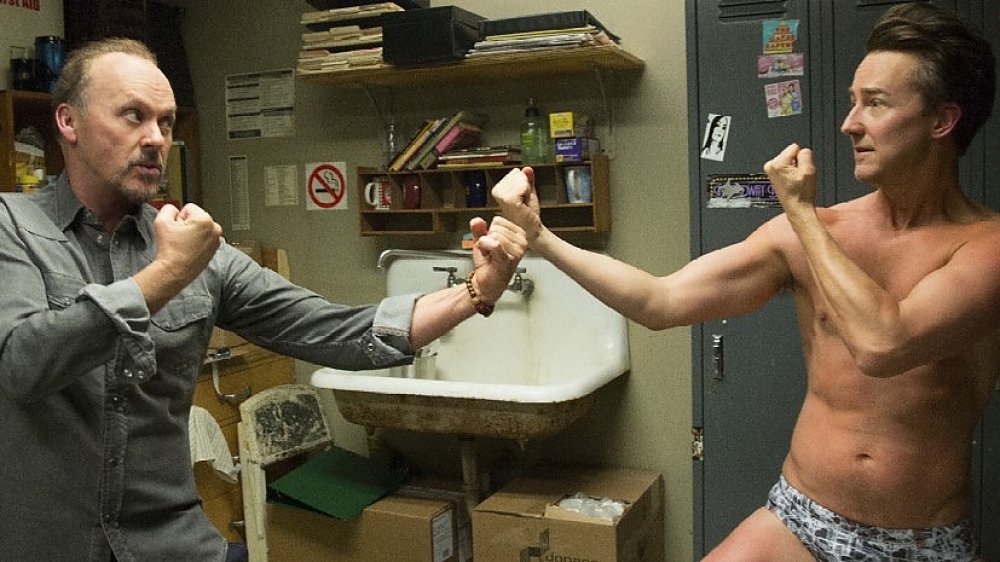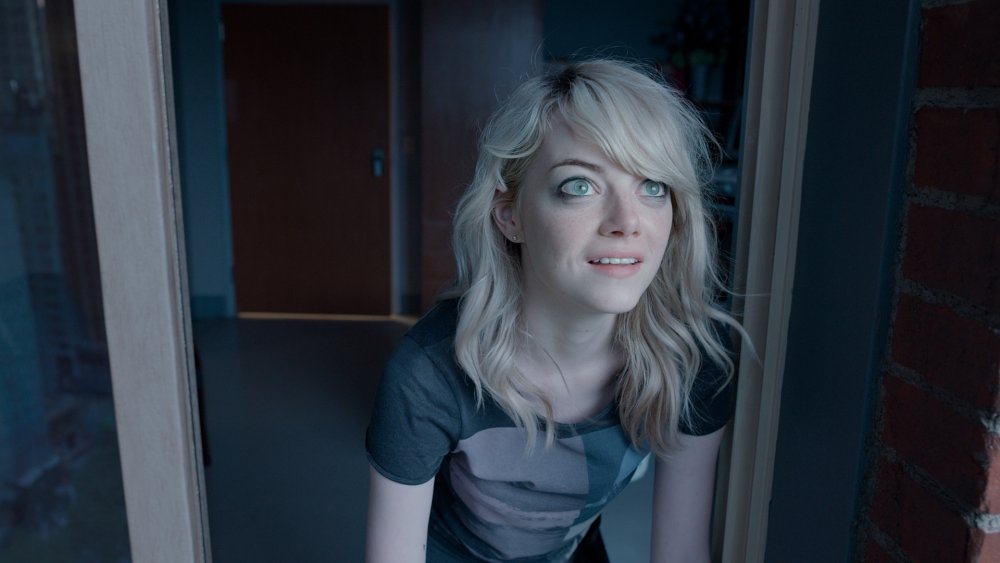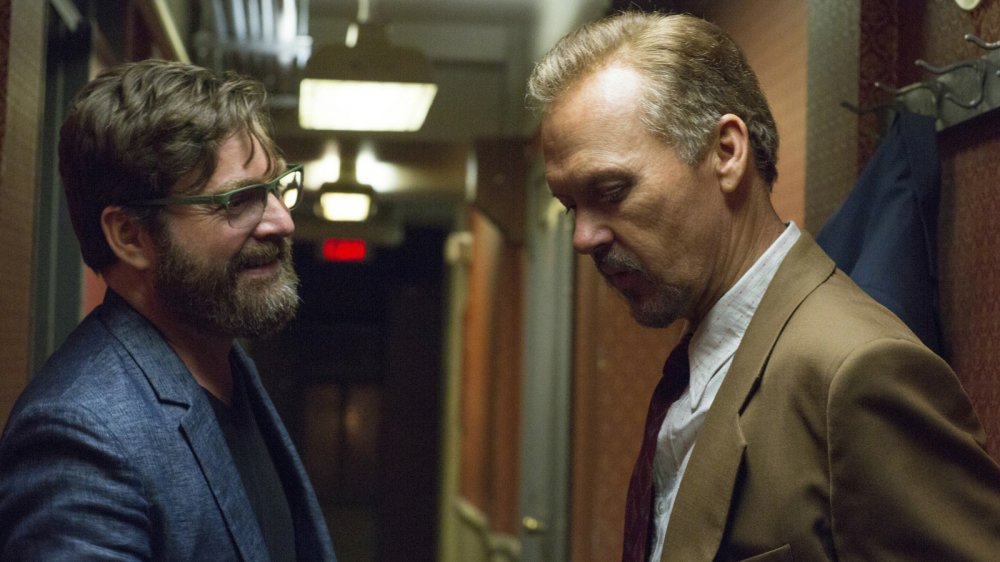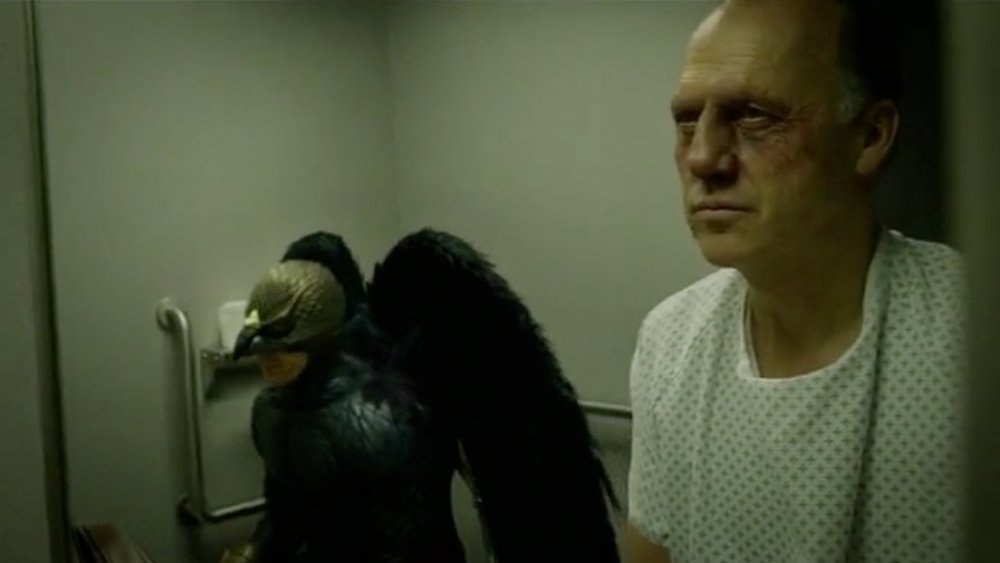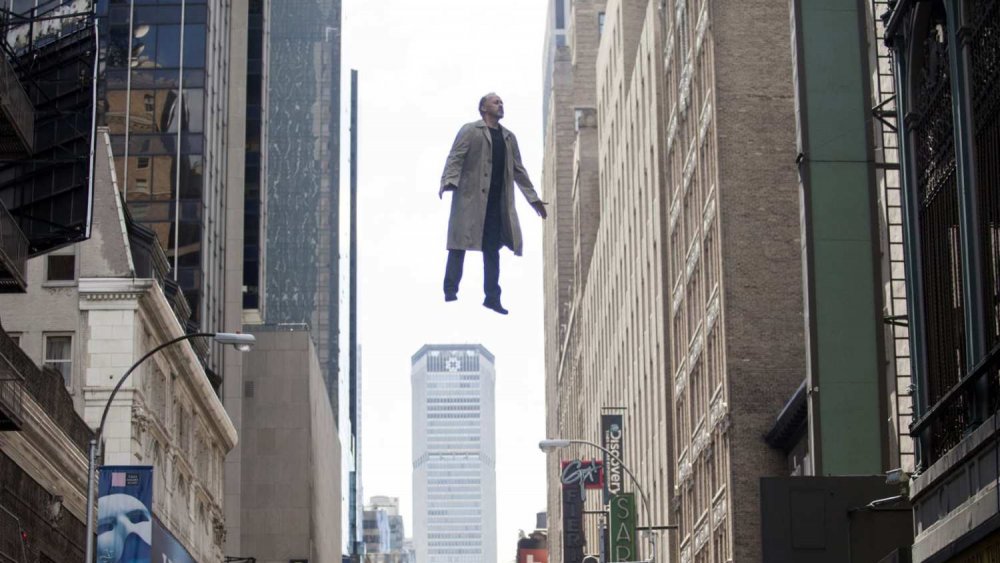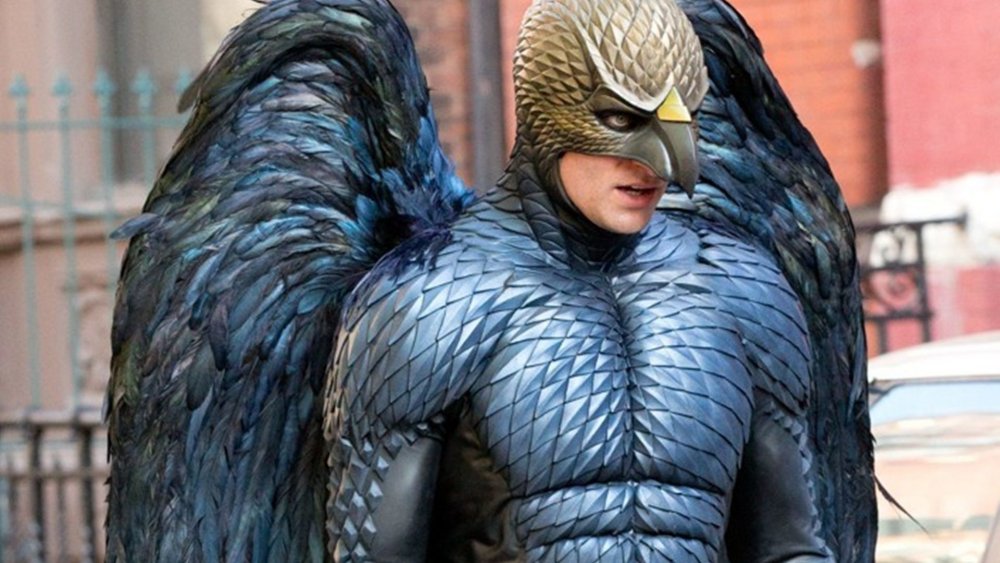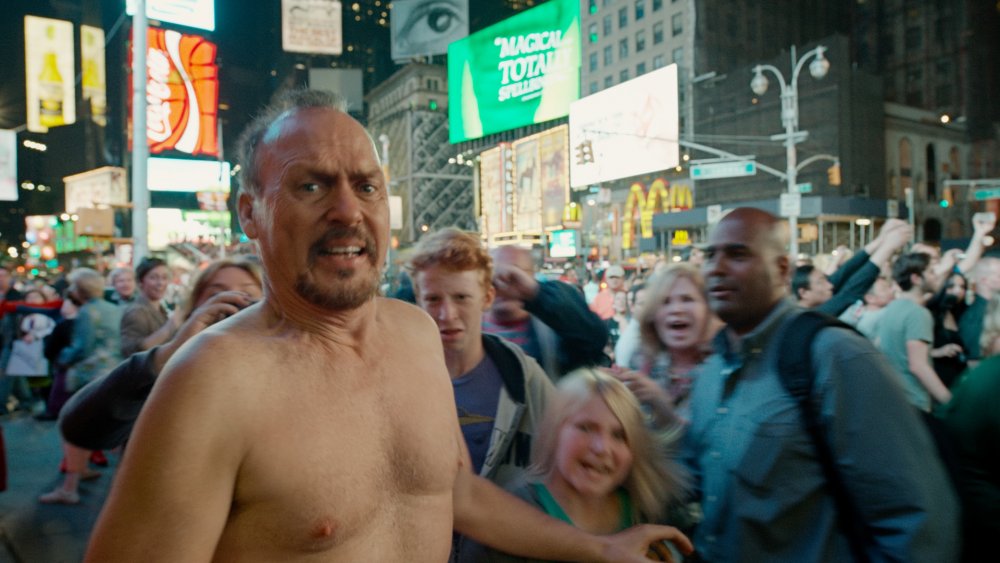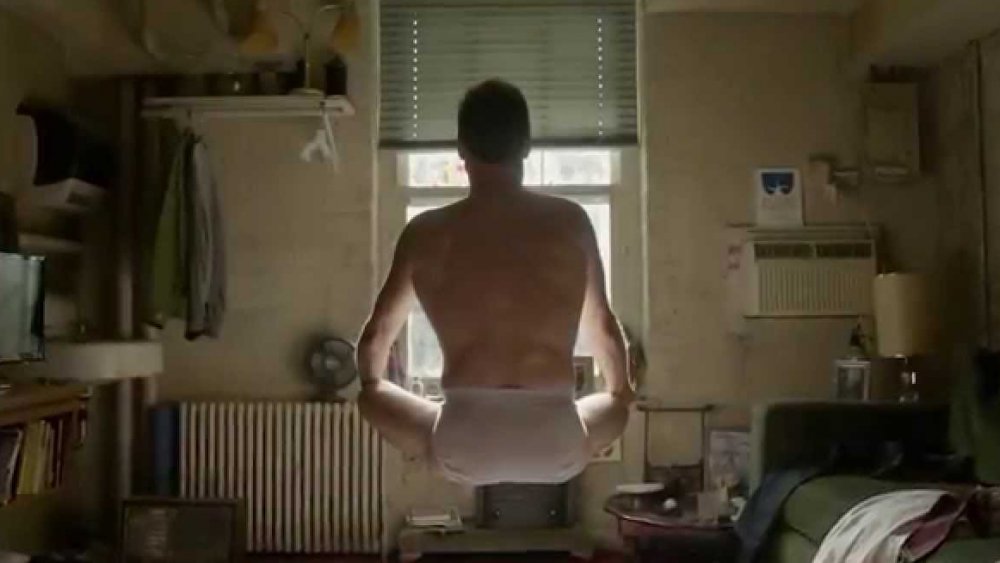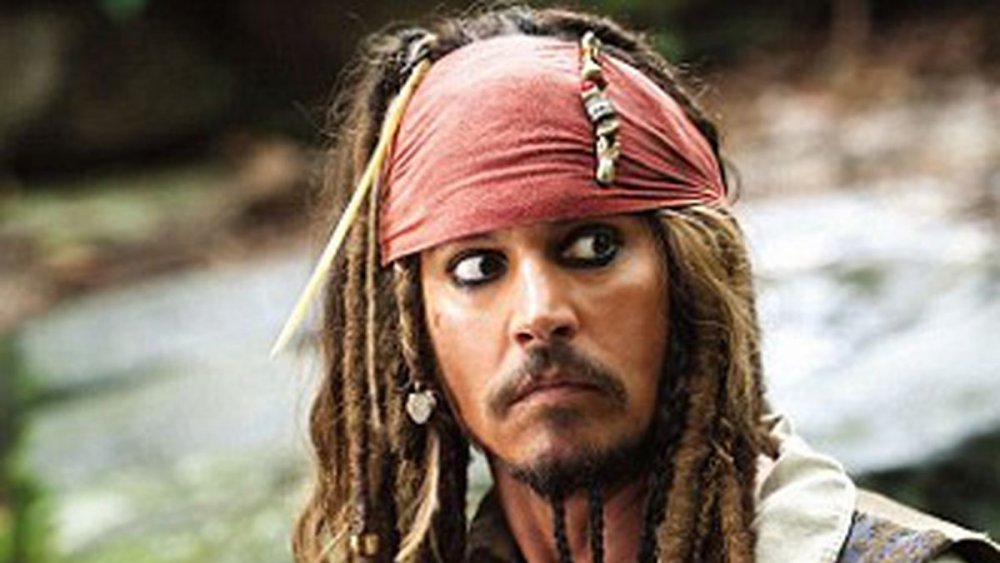The Ending Of Birdman Explained
When Birdman reached theaters in 2014, it was an instant sensation due to a combination of its engaging visuals, thrilling performances, and all-around surreal viewing experience. Leveraging an experimental storytelling structure that leaned heavily into magical realism, the experiment paid off, garnering the movie four Academy Awards including Best Picture, Best Director, Best Original Screenplay, and Best Cinematography, as well as nominations for Best Actor, Best Supporting Actor, and Best Supporting Actress, and technical noms for Best Sound Editing and Best Sound Mixing. Suffice to say that critics and audiences alike were impressed.
But any time a filmmaker decides to get experimental or surreal, the audience is going to be left with a few questions. Birdman, with its weird, ambiguous ending, is no exception. A lot of viewers walked out of the theater wondering what was real and what was imagined. Did Michael Keaton's Riggan Thomson die... or did he fly away into fame and glory?
We're here to explain the ending of Birdman and clear things up. And we're going to be talking about the ending in detail, so if it wasn't already obvious, there are spoilers aplenty ahead.
In a nutshell
Birdman spans a day in the life of Riggan Thomson, a down on his luck actor (played by Michael Keaton) who once enjoyed worldwide fame portraying a popular comic book hero (much like Keaton did himself in his turn as Batman) before his career started to wane. Now he's trying to make his big comeback by starring in and directing a Broadway play, although it isn't working out as well as he'd hoped.
The movie shows the highs and lows of a particularly difficult day of rehearsals and performances as Riggan is forced to wrangle a challenging new addition to the cast (played by Edward Norton), all the while confronting problems with his daughter (played by Emma Stone). Throughout the film, he is haunted by his most famous character — Birdman — as he experiences a number of surreal events, including stepping off a rooftop and flying over the streets of New York.
The ending
At the end of the film, the stress becomes too much and Riggan tries to kill himself with a gun during a performance of the play. Waking in the hospital, he discovers that the suicide attempt was misinterpreted as some innovative form of shock theater, and suddenly it appears that he will be thrust into success again. He also finds that he'd shot off his nose, and that the new reconstruction looks suspiciously similar to a bird's beak. Weird new look aside, it seems as if everything is finally turning Riggan's way.
During the final scene, however, he leaps from a window — presumably to his death. Or did he die after all? We're not sure, because when his daughter goes to the window to look at where he should have plummeted to the ground, she turns her gaze up and seems to smile in delight at what we can only guess is her father flying as he had in his previous hallucinations.
So did Riggan fall to his death? If so, what was with his daughter's reaction? Or did he actually turn out to have his Birdman-like powers, and fly away? Or was the whole thing a fantasy all the way through? Questions like these have plagued fans since the movie's release.
What's it all about?
To really get at what the ending is all about, we have to start by asking what the movie is trying to say in general. There are several major themes at play in Birdman. It tackles questions of love, truth, and identity, but perhaps the most looming theme involves the issue of success versus integrity, or to put that in cinematic terms, blockbuster fame versus authentic artistry.
Throughout the film, Riggan is literally haunted by the success he enjoyed in the past while engaged with a superhero franchise, but now he's attempting to create something that will garner him acclaim for his creative talents — something any artist will tell you is easier said than done.
Most telling is a scene in which Riggan discusses casting options with his producer, played by Zach Galifianakis. They run through a series of names: Woody Harrelson? Nope, he's busy with The Hunger Games. Michael Fassbender? No dice, because he's filming "the prequel to the X-Men prequel." Jeremy Renner? He's out too, because "he's an Avenger." The point being that Hollywood seems to have snatched up all the talent and crammed it into high-budget, low-art blockbusters.
The symbols in Birdman
Birdman is rich with symbols that are intended to support the movie's various themes, but for our purposes of unlocking the secret of the end, two stand out: flight and Riggan's reconstructed nose.
Flight shows up again and again. Riggan flies to escape his own sense of low self-esteem and lack of control. The Birdman character haunting him flies to symbolize his power over Riggan, or in other words, the power that blockbuster fame holds over his more passionate creative endeavors. And at the very end, just before Riggan disappears through the window, he sees a flock of birds take flight. These represent freedom.
As for his new nose, when Riggan peels off the bandages covering the nose, this is his symbolic peeling away of his old self, and therefore his need for superstardom and Birdman. But beneath the bandages, there he finds the beak-like proboscis. This is a glaring reminder of the fact that no matter how hard he tries, Birdman will always be a part of him.
Was it all just a dream?
Director Alejandro Gozalez Iñárritu has remained mum when it comes to clearing up confusion around the ambiguous ending, seeming to prefer to leave conclusions up to the audience.
One possible interpretation is that the ending is some kind of dream that Riggan is experiencing in the moment of his death. Essentially, this would mean that his suicide attempt was successful, and everything after that is a hallucination he's experiencing.
In other words, this theory means that he's dreaming of a happy ending in which he finally gets the critical acclaim he so desired, is reconciled with his ex-wife and daughter, regains the adoration of fans, and proves he's an actor to be taken seriously and not some Hollywood "hack."
This implies that all of the magical realism portrayed in the film — the hovering and flying, the telekinesis, and the voice of Birdman — was all a series of hallucinations. So maybe most or all of the weirdness was just a dream?
Riggan is Birdman?
Another possible interpretation is that Riggan actually does have the power to fly, and in fact could even be Birdman — or at least some variety of superhero. Under this theory, Riggan has — knowingly or unknowingly — had superpowers all along, and has either been trying to come to terms with these powers himself, or get the world to recognize them.
In this case, in the end he would have survived the gunshot just as the movie shows, earning the respect of critics, fans, and his family in the process. Then when he jumps from the window and his daughter looks out at the sky and smiles, she's doing so because she's realizing for the first time that her father can actually fly, and it's a look of delight and amazement.
This theoretical interpretation would be the most fundamentally happy ending, proving to his antagonists in the movie as well as the audience that he's more than some mere actor struggling to dig his way out of a rut, but is instead a dedicated artist willing to commit an act of self-mutilation in pursuit of a great performance, as well as a superhero imbued with the power to fly.
A little of both?
One final interpretation of the ending would be something of a blend of the first two. In this case, it suggests that he did survive the suicide attempt, and in the process earned the respect of family, fans, and critics as shown in the final hospital scene. So that's all real.
But as it turns out, Riggan is so depressed (or possibly mentally ill, as his hallucinations and schizophrenic-like voices suggest), that he jumps out of the window either attempting suicide again or having some kind of psychotic break from reality. In this theory, whether he is genuinely trying to kill himself or he thinks he can fly, the outcome is the same — he plunges to the ground and presumably his death.
Remember those symbols we mentioned earlier? Flight and the nose? They would play strongly into this theory. When Riggan sees the nose and realizes that he'll never escape his connection to Birdman, he finds this deathly depressing. Then when he sees the birds flying, he decides that his only way to be free is to fly away — whether that means flying out the window to his death, or actually taking flight and escaping into the sky.
This theory, however, is muddled by his daughter's smiling reaction at the window. Could it be that he intended to kill himself, only to find that he actually could fly? Or maybe she's seeing the meteor shower that was briefly shown at the film's opening? Or is she just relieved that her father is finally at peace?
In any case, each of these theories still leaves wiggle room for interpretation.
What do the filmmakers say?
If you've been hoping the filmmaking team behind Birdman would help clear things up, well, you're out of luck. Speaking in an interview with HuffPost Live, Birdman screenwriters Alexander Dinelaris Jr. and Nicolas Giacobone admitted that the whole thing was rather ambiguous.
"We're not going to sit around and explain the ending," said Dinelaris. "I guess my thing is, if you can silence the voice of mediocrity, then what is possible? [That] is good enough for me. But we thought if we answered that question at the end, it would seem very, very small. Is he famous because he shot himself? That's small. Is he still miserable? That's small. Everything seemed small."
In Dinelaris' view, the way the story ends is all about maintaining a sense of circularity and consistency. "It goes back to Alejandro because he starts the movie on ... this character Riggan Thomson floating in his underwear three feet above the ground," he added. "That's inexplicable. At that moment, it's inexplicable. The last moment is inexplicable. They have to be, because in a way that's Alejandro just trying to express that sense of confusion about what he is in his own life."
So that's Dinelaris' perspective. What about director Alejandro Gozalez Iñárritu? What does he have to say about it? Not much, unfortunately. "At the ending of the film," he shrugged, "(it) can be interpreted as many ways as there are seats in the theater."
An alternate ending
According to the writers, they considered an alternate ending that might have provided a clue.
"The camera prowled like it did the whole film, [and] went backstage through the halls we've seen the whole time, and we'd get to the dressing room where literally Johnny Depp would be sitting looking in the mirror and putting on his Riggan Thomson wig, and then the poster of Pirates of the Caribbean 5 would be in the back," Dinelaris revealed in a 2015 interview. "In Jack Sparrow's voice [Depp would say], 'What the f*** are we doing here, mate?' It was going to be the satire of the endless loop of that."
In other words, yet another renowned actor struggling to escape the shadow of hackdom would have taken Riggan's place, which seems to indicate that he had in fact died.
So in the end, after taking all these theories and possibilities into account, how are we to interpret the final scene of Birdman? It seems that in the end, it really is up to you.
